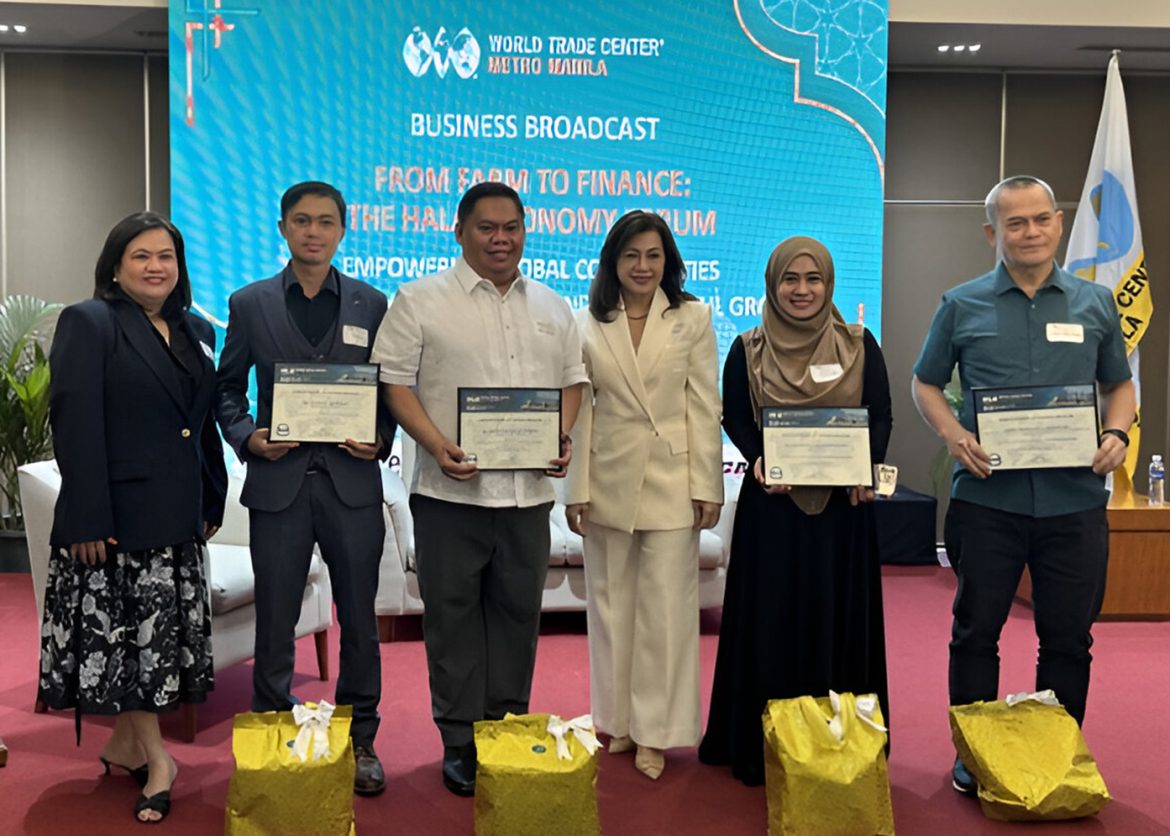THE WORLD Trade Center Metro Manila (WTCMM) hosted the Business Broadcast: The Halal Economy Forum – From Farm to Finance, a one-day event that brought together over a hundred participants from government agencies and the business community. The forum explored the growing opportunities within the Halal ecosystem—from agriculture and food production to banking, finance, and investment.
“Halal is no longer just a religious designation—it is a national development strategy.” This was the prevailing message of the Forum as officials and industry experts highlighted how the Halal economy represents a powerful framework for inclusive growth, food security, and ethical finance.
In the Philippine context, Halal is gaining traction not only because of the growing domestic Muslim market but also due to rising demand from export markets in the Middle East, Southeast Asia, Europe, and North America. With its robust agricultural base and strategic location, the Philippines holds vast potential to become a competitive Halal hub in Asia Pacific.
The morning session focused on Halal food production and the opportunities for small and medium enterprises (SMEs) to scale through certification and compliance with international standards. Ms. Juhainah Javier of Mubarak Fresh Foods shared her inspiring entrepreneurial story—starting her business with just two kilos of product sold daily, which grew to more than 100 kilos a day after she obtained her Halal certification. Her success demonstrated the credibility and market access that certification brings, especially for businesses seeking to penetrate institutional and export markets.
Engr. Zamzamin L. Ampatuan, undersecretary for regulations and infrastructure at the Department of Agriculture, underscored that Halal food production offers the Philippines a pathway to food security, export competitiveness, and rural empowerment.

underscored the opportunities that Halal food production offers the Philippines.
“Halal is a standard of hygiene, ethics, and quality. Our farmers are ready to meet that standard,” he said, noting the government’s commitment to supporting Halal-compliant food infrastructure, including a ₱350-million poultry facility in Tarlac.
Ampatuan cited that the domestic Halal food demand already exceeds ₱6.6 billion annually, with dairy, beef, and poultry comprising nearly 90% of local consumption. He called for greater investment in scaling production and aligning agricultural programs with global Halal protocols.
A panel discussion followed, featuring experts who provided practical guidance on how businesses—both emerging and established—can take advantage of gaps in the Halal value chain, particularly in certification, logistics, and product diversification.
The afternoon session transitioned to Halal finance, opening with a compelling presentation from Atty. Arifa Alah of the Bangko Sentral ng Pilipinas (BSP). She provided a clear and straightforward explanation of the difference between conventional banking and Islamic banking, emphasizing how both systems can serve as vital sources of capital for entrepreneurs and enterprises.
Dato’ Abdul Malik Melvin Castelino, Ambassador of Malaysia to the Philippines, delivered the keynote address, emphasizing that Islamic finance is not a niche concept but a scalable, ethical framework supporting inclusive development and cross-border investment.

“Malaysia’s success in building a dual banking system shows that Islamic finance can coexist with conventional models while expanding access and deepening trust,”
Meanwhile, Dr. Aleem Siddiqui M. Guiapal, program head of the Philippine Halal Industry Development at the Department of Trade and Industry, urged the institutionalization of Islamic finance to attract ethical capital and support the growth of Halal enterprises.
“Halal is now a global lifestyle economy. We must build systems that integrate food, finance, and faith into a cohesive development strategy,” he said, citing the successful issuance of a $1-billion Sukuk bond in 2023 as proof of growing investor confidence.
The afternoon culminated with another panel discussion where experts addressed audience questions on Islamic banking, finance, and insurance. The session provided clarity on how businesses can access Shariah-compliant financing instruments and Takaful (Islamic insurance) to expand operations or enhance resilience against market risks.
The forum aligned closely with the goals of the Philippine Halal Industry Development Strategic Plan 2023–2028, which seeks to double Halal-certified output, generate 120,000 jobs, and attract ₱230 billion in investments. With over 3,000 Halal-certified products and a growing reputation in Muslim-friendly tourism, the Philippines is steadily positioning itself as a regional Halal hub.
Organized by WTCMM, the event was supported by the Department of Trade and Industry – Halal Office, Bangko Sentral ng Pilipinas, Maybank Philippines, Etiqa Philippines, Miguelitos, and M Catering. Their active participation reflected a shared commitment to advancing the Halal economy as a driver of national development.
Part of the WTCMM Business Club’s Business Broadcast series, the Halal Economy Forum forms part of the organization’s continuing trade education program, where experts and industry leaders discuss trends and insights aimed at empowering entrepreneurs and companies to harness new market opportunities.
Through its Business Broadcast platform, the World Trade Center Metro Manila continues to serve as a strategic venue for dialogue and collaboration among government, industry, and the entrepreneurial community. The Halal Economy Forum: From Farm to Finance not only expanded awareness of Halal opportunities but also deepened the national conversation on building an economy anchored on ethics, inclusivity, and sustainable growth.
By bringing together experts, entrepreneurs, and policymakers under one roof, WTCMM reaffirmed its role as a catalyst for knowledge-sharing, capacity-building, and business empowerment in the Philippines’ evolving trade landscape.



